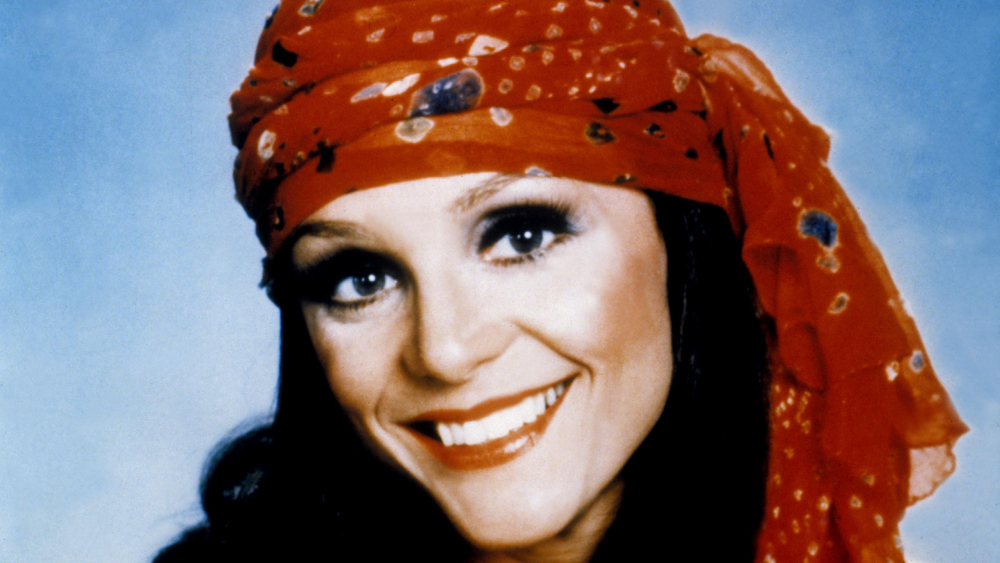Harper's Rhoda was everybody's best friend in the 1970s, the gal pal many faithful fans of "The Mary Tyler Moore Show" wished they had.
She was open-hearted, honest and all too human. She laughed at herself and at life as she struggled with her weight, her career and, for the first few seasons, her love life, lending her portrayal of Moore's wisecracking sidekick an endearing quality that resonated powerfully with viewers.
Fans identified so strongly with Rhoda that they sometimes seemed to regard the actress and her popular character as one and the same, Harper often said.
"I think the character just clicked with people because there was something real about her," Harper once told the Passaic County, N.J., Herald News. "Mary had this politeness and squareness about her. But Rhoda was Rhoda. She was a kick in the butt."
The actress won four Emmys as the beloved character, including for her leading role on "Rhoda," the spinoff that ran from 1974 to 1978.
Harper was diagnosed with lung cancer in 2009, and in early 2013 she learned it had become terminal after spreading to the lining of her brain. Doctors told her she had three months to live, but she began chemotherapy and plunged back into work anyway.
In the fall of 2013, she joined the cast of "Dancing With the Stars," appearing with Tristan McManus. She also reunited with Moore and other principals from "The Mary Tyler Moore Show," including Betty White, Cloris Leachman and Georgia Engel, who died in April 2019, for the finale of TV Land's "Hot in Cleveland." Moore died in 2017.
"The message of all of this is don't give up on your life worrying about death," Harper told the Los Angeles Times in 2014, when she guest starred in the Hallmark Channel series "Signed, Sealed, Delivered."
She embraced the role of cancer survivor, working with the American Lung Association to raise awareness of lung cancer's impact on women, particularly those who, like Harper, never smoked.
A former dancer in Broadway musicals and an accomplished improvisational actress, Harper was also a political activist who worked for many progressive causes, including women's rights and fighting hunger.
In 2001, Harper lost a bruising campaign for the presidency of the Screen Actors Guild, Hollywood's biggest labor union, to Melissa Gilbert, the actress who starred in the 1970s hit "Little House on the Prairie." After alleging election irregularities, Harper lost to Gilbert again when the union held a new election in 2002.
On stage, Harper played former Israeli Prime Minister Golda Meir and 1930s star Tallulah Bankhead. But she was best known as Rhoda, the tart-tongued department store window dresser beset with insecurities. One reviewer dubbed the character a "triumphant loser" for her ability to rebound.
In 1970, Harper was appearing in a play at Los Angeles' Mark Taper Forum when she auditioned for the role of Moore's neighbor in the star's proposed new series, which would tell the story of an unmarried career woman making a fresh start in Minneapolis.
Harper badly wanted the part; to get a leg up, she carted along some props, a bucket and rag, to use in a window-washing scene she knew would be part of the audition.
"The Mary Tyler Moore Show," which aired on CBS from 1970 to 1977, was a hit, showcasing the late Moore as a cool but vulnerable independent woman in her early 30s who works as an assistant producer for a news program at a Minneapolis TV station.
Along with Moore and Harper, it starred Ed Asner as the irascible but warm-hearted producer Lou Grant and a host of other memorable characters, including preening news anchor Ted Baxter, played by Ted Knight; Phyllis, Mary's busybody landlady, played by Leachman; and Sue Ann Nivens, the perky on-screen homemaker, played by Betty White.
Harper was an immediate fan favorite, known for her ability to deliver the stream of one-liners, most of them about food or men, provided by the show's writers. "I don't know why I should even bother to eat this," Rhoda said of a piece of candy, in one oft-repeated line. "I should just apply it directly to my hips."
She won three consecutive Emmys as best supporting actress in a comedy for the role. In 1975, she won a fourth, as lead actress, for "Rhoda," in which a slimmed-down, more chic version of the character moves home to New York and, at long last, lands a man.
A thoroughly modern woman, at least for network television of the day, Rhoda got married, separated and divorced, all on the air. The show's first segment, which aired Sept. 9, 1974, dislodged "All in the Family" from its perennial spot atop the Nielsen ratings; Rhoda's on-air marriage that October to Joe Gerard, played by David Groh, was one of the most watched events in television sitcom history.
The show's appeal, critic Bill Davidson wrote in The New York Times Magazine, "lies in the fact that audiences seem to identify with the character of Rhoda."
"Like you and me," he wrote, "she's uncertain and battered ... and we cheer her on."
In 2000, Harper reunited with Moore for a TV-movie reunion, "Mary and Rhoda."
But her television career after "Rhoda" was not always smooth. An NBC comedy, "Valerie," in which she starred as homemaker Valerie Hogan, began in 1986 but erupted in a contract dispute a year later. Harper was fired in 1987, and she later sued Lorimar Television for wrongful termination, eventually winning a multimillion-dollar settlement from the production company.
Harper was born August 22, 1939, in Suffern, New York, the middle of three children of Iva, a nurse, and Howard Harper, a lighting sales executive. She was, as she described herself in "I, Rhoda," her 2013 memoir, "an average, chunky little brunette with a pronounced lisp that I didn't lose until the third grade."
Her father's career required frequent moves, and as Harper was growing up, the family lived in Oregon, Massachusetts, Michigan and Southern California. By age 6, according to her memoir, she knew she wanted to be a performer and began taking dance lessons. She became serious about ballet in grammar school in Pasadena, California.
When she was about 12, her family settled in Jersey City, New Jersey.
By 16 she had developed a talent that propelled her to Radio City Music Hall's corps de ballet, the famous theater's "other" dance troupe. She appeared as a chorus line dancer in several Broadway musicals, including "L'il Abner" and "Wildcat," which starred Lucille Ball.
She studied drama, eventually meeting and marrying Richard Schaal, an actor with the Chicago-based Second City improv group, which she also joined. In 1969, the couple moved to Los Angeles, where Schaal founded a theater company. They later divorced.
She met her second husband, Tony Cacciotti, an actor turned physical trainer, in the late 1970s, when she hired him to help her get in shape for a bathing suit scene in the 1979 Neil Simon film "Chapter Two." They married in 1979 and had a daughter, Cristina.
In a 2017 People interview, Harper credited Cacciotti, who became her devoted caregiver, for her longevity.
"He does everything for me, drives me everywhere, makes sure I'm eating healthy, walking and lifting weights. Really, he's the best nudge in the world," she said.
Over the years, Harper spoke out often about aging, sharing her belief that women - and society - should set aside the fear of getting older, as long as the process was normal and relatively healthy. In 2001, she published a book of humorous essays on the topic, "Today I Am a Ma'am, and Other Musings on Life, Beauty and Growing Older."
Harper told the San Francisco Chronicle in 2002 that the nation's obsession with youth was tragic. She spoke frequently about aging with several friends, she said - "girlfriends, although none of us have been girls for four decades."
"So the bodies are indeed going south," she said, "but the spirit only expands."
----------------------------------------------------------------------------------------------









 Home
Home Politics
Politics











